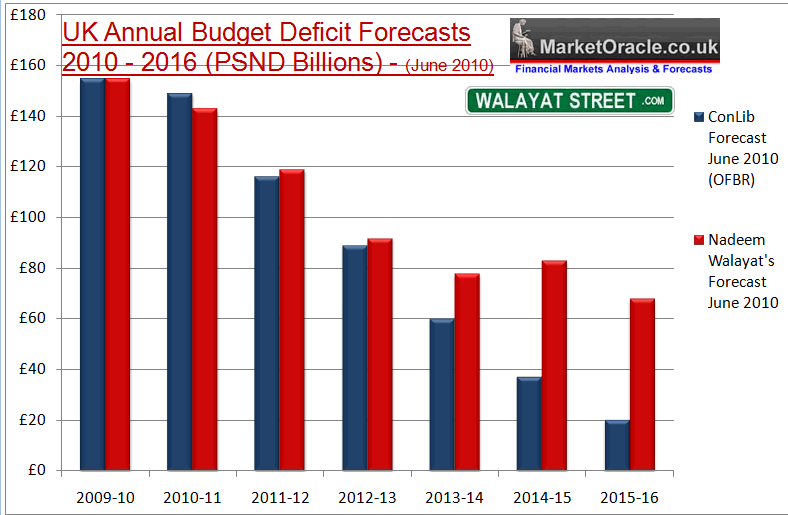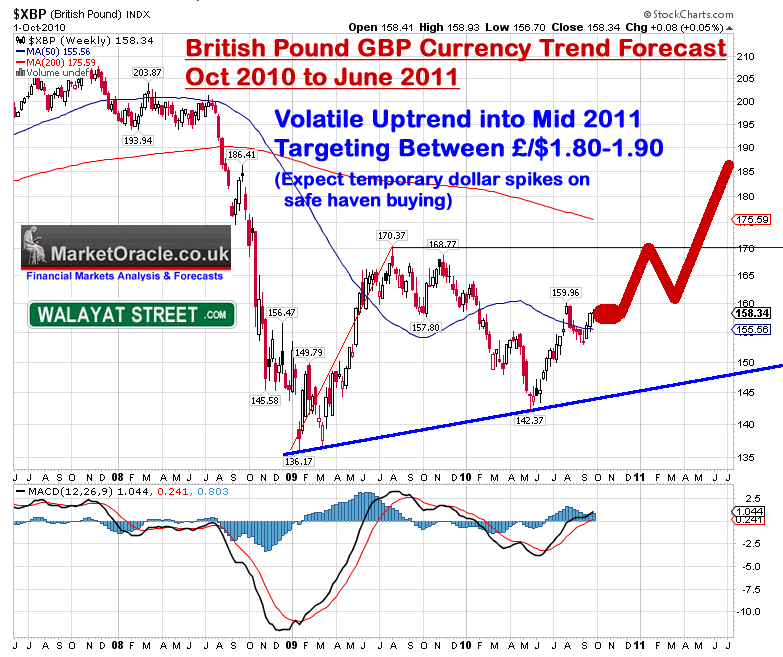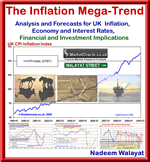UK Economic Boom Continues, GDP Q3 2010 +0.8%, Academic Economists Remain Clueless
Economics / UK Economy Oct 26, 2010 - 12:39 PM GMTBy: Nadeem_Walayat
 The UK economic boom continued into the third quarter of 2010 with GDP jumping by 0.8% (+3.2% annualised), that itself followed on from an eye wateringly high growth rate of 1.2% for Q2, both of which were missed by the academic economists that populate the financial institutions and journalists / pseudo economists in the mainstream press that only hours before were expecting growth of 0.4% (1.6% annualised), which despite the economy booming still continue with mantra's based on theoretical models for a none existant double dip recession whilst the real economy literally booms.
The UK economic boom continued into the third quarter of 2010 with GDP jumping by 0.8% (+3.2% annualised), that itself followed on from an eye wateringly high growth rate of 1.2% for Q2, both of which were missed by the academic economists that populate the financial institutions and journalists / pseudo economists in the mainstream press that only hours before were expecting growth of 0.4% (1.6% annualised), which despite the economy booming still continue with mantra's based on theoretical models for a none existant double dip recession whilst the real economy literally booms.
Britain's economic boom manifested itself in the construction sector that grew by 4% which continues to reflect catchup on the 1st quarter bad weather as also observed during Q2 growth of 1.2%. The rest of the economy as illustrated by manufacturing and the services sector still grew by a decent 0.6%.
George Osbourne the Chancellor for the coalition government claimed the strong growth as a consequence of his governments policies)
"What you see today, in an uncertain global economic environment, is Britain growing, growing strongly, the strongest growth we have seen in this part of the year for a decade, and also our country's credit rating being secured.
"That is a big vote of confidence in the UK and a vote of confidence in the coalition Government's economic policies.
"I think that will underpin confidence in the recovery going forward."
However, the facts are that coalition governments actions to date have YET to have ANY impact on the UK economy, the impact for which still remains several months away. Therefore ALL of the growth so far this year has been as a consequence of the previous Labour government actions.
UK Economy Growth Forecast 2010 to 2015.
UK GDP Growth for Q3 of 0.8% was inline with my forecast of December 2009 (31 Dec 2009 - UK Economy GDP Growth Forecast 2010 and 2011, The Stealth Election Boom ) that forecast Q3 growth of 0.9% which is set against Reuters poll of academic economists YESTERDAY that forecast GDP growth for today's release of 0.4%. The below graph illustrates the forecast trend for UK GDP (ABMI chain linked at market prices, change on year earlier). The UK GDP Growth trend forecast was updated following the June Emergency Budget that resulted in a revision for 2011 growth from +2.3% to +1.3% (09 Aug 2010 - UK Economy GDP Growth Forecast 2010 to 2015).
- UK GDP 2010 2.8%
- UK GDP 2011 = 1.3%
- UK GDP 2012 = 1.1%
- UK GDP 2013 = 1.4%
- UK GDP 2014 = 3.1%
- UK GDP Mid 2015 = 3.3%

Economic Austerity
The announcement of planned spending cuts of £81 billion across specific departments last week did not impact on the forecast GDP growth trend as expectations continue for the planned austerity measures to be abandoned during 2013 in advance of a May 2015 election boom as illustrated by the below deficit graph that remains unchanged from June 2010.

S&P Rating Agency Rewards Coalition Government Austerity Plans
Rating agency S&P abandoned its previous negative outlook for the UK economy by stating : "We believe that the completion of the government's spending review, announced on 20 October, reduces uncertainties about its political resolve to tackle the challenges resulting from the structural deterioration in public finances between 2007 and 2009"
British Pound Reacts Strongly to GDP Data
Sterling reacted strongly to GDP data by rising from £/$1.57 to £/$1.59 against the U.S. Dollar. The trend continues to manifest itself inline with my forecast for GBP to trend towards at least £/$1.85 by mid 2011 as illustrated by the below graph (04 Oct 2010 - British Pound Sterling GBP Currency Trend Forecast into Mid 2011).

Economic Propaganda and Clueless Academic Economists
UK GDP Q3 data of 0.8% again illustrates why academic economists can miss whole recessions as they perpetually remain fixated on ivory tower produced rear mirror looking theoretical models, which ensures that they will always be several years behind the curve, this is coupled with the fact that many institutions such as the Bank of England are engaged in publishing economic propaganda rather than forecasts as they try to sooth the populations growth and inflation expectations (13 Aug 2010 - The Real Reason for Bank of England's Worthless CPI Inflation Forecasts) as the alternative of more truth publications on economic expectations would result in making the BoE's job of managing the economy far harder, which is illustrated by the mantra from the Bank of England Governor downwards for the whole of 2010 that UK inflation above CPI 3% was always just temporary, so as to persuade British workers into accepting wage cuts and wage freezes, when the Bank of England's own staff Pension fund revealed its true inflation expectations that during 2009 tripled its holdings of Inflation Index Linked UK Government Bonds to 70% of the total fund in advance of pumping out continuous temporary inflation mantra that the pseudo economists that populate the mainstream press were eager to regurgitate at length for the whole of 2010 and continue to do so to this day, which is why the boom will have come and gone by the time the mainstream becomes aware of it.
A clear example of economic propaganda by vested interests are recent statements by the CBI that forecast UK GDP growth for 2010 of just 1.6% (up from 1.3% and 1.2%), when the UK had already experienced growth of 1.5% for Q1 and Q2, therefore after today's data the CBI is effectively forecasting a 0.7% contraction for Q4. The reason for this is that the CBI wants interest rates to remain at 0.5% for as long as possible and for the Bank of England to continue to print money to inflate the economy as that will generate more profits for its membership.
Mainstream Press and Think Tank UK Growth Forecasts for 2010 (December 2009)
UK Economic Growth 2010 - LoveMoney - 30th Dec 2009
| Forecaster | Forecast |
| European Commission | +0.9% |
| International Monetary Fund | +0.9% |
| David Kern, British Chambers of Commerce | +1.1% |
| Organisation for Economic Co-operation and Development (OECD) | +1.2% |
| Alistair Darling, Treasury | +1% to +1.5% |
| Bank of England | +2.1% |
Considering the OECD recently had to double its growth forecast for 2010, it's clear forecasts are unreliable.
CBI Predicts Fragile Economic Recovery - BBC 21st Dec 2009
The CBI predicts that the UK will exit recession in the fourth quarter of 2009, helped by consumer spending ahead of the VAT rise in January. But the group says the economy is unlikely to have returned to pre-recession levels by the end of 2011.
It says unemployment will peak at 2.8 million - lower than first forecast. Annual growth of 1.2% in 2010, followed by growth of 2.5% in 2011
What will happen to the economy in 2010? - ThisisMoney 29th Dec 2009
This growth should prove sustainable well into 2010, and the average prediction from leading UK's economist is for Gross Domestic Product (GDP) to rise at a rate of 1.4% next year.
The above forecasts illustrate the continuing abysmal failure of academic economists that had typically forecast anaemic growth for 2010 of just 1% that fed the double dip mantra in the mainstream press, when in reality the UK economy is on target to achieve near TRIPLE the forecast growth rate.
Double Dip Recession Mantra
The following illustrates double dip recession mantra in the mainstream press during mid year.
Telegraph - Britons' fears raise double-dip recession chance
The prospect of a double-dip recession in Britain is increasing with every month as consumer confidence dwindles to recession levels, a long-running study signaled.
Bloomberg - Blanchflower Says Budget `Certain' to Lead to Double Dip
Former Bank of England policy maker David Blanchflower said the spending cuts the government plans in its emergency budget tomorrow “look certain” to push the U.K. back into a recession.
“You can’t just decimate the public sector and assume the private sector will step into the hole,” Blanchflower said in an interview on Bloomberg Television’s “Countdown” in London today. “The danger now is we’re certainly going into a double- dip recession. I think that’s absolutely certain given what’s coming.”
Financial Times, Martin Wolf is worried that the concerted austerity of Germany, Britain and other industrialised countries may "destroy the recovery".
Guardian - Britain's leading companies increasingly fear the UK could suffer a double dip recession because of government public spending cuts and a renewed economic slowdown across the globe, according to a report released today.
Telegraph - A survey of chief financial officers (CFOs) by Deloitte found that a balance of just 24pc were feeling more optimistic in the second quarter, compared with 40pc in the first quarter.
It was the lowest level in 12 months, as the average CFO attached a 38pc probability to the chance of a double-dip, up from 33pc previously.
Comments and Source : http://www.marketoracle.co.uk/Article23793.html
By Nadeem Walayat
Copyright © 2005-10 Marketoracle.co.uk (Market Oracle Ltd). All rights reserved.
 Nadeem Walayat has over 20 years experience of trading derivatives, portfolio management and analysing the financial markets, including one of few who both anticipated and Beat the 1987 Crash. Nadeem's forward looking analysis specialises on UK inflation, economy, interest rates and the housing market and he is the author of the NEW Inflation Mega-Trend ebook that can be downloaded for Free. Nadeem is the Editor of The Market Oracle, a FREE Daily Financial Markets Analysis & Forecasting online publication. We present in-depth analysis from over 600 experienced analysts on a range of views of the probable direction of the financial markets. Thus enabling our readers to arrive at an informed opinion on future market direction. http://www.marketoracle.co.uk
Nadeem Walayat has over 20 years experience of trading derivatives, portfolio management and analysing the financial markets, including one of few who both anticipated and Beat the 1987 Crash. Nadeem's forward looking analysis specialises on UK inflation, economy, interest rates and the housing market and he is the author of the NEW Inflation Mega-Trend ebook that can be downloaded for Free. Nadeem is the Editor of The Market Oracle, a FREE Daily Financial Markets Analysis & Forecasting online publication. We present in-depth analysis from over 600 experienced analysts on a range of views of the probable direction of the financial markets. Thus enabling our readers to arrive at an informed opinion on future market direction. http://www.marketoracle.co.uk
Disclaimer: The above is a matter of opinion provided for general information purposes only and is not intended as investment advice. Information and analysis above are derived from sources and utilising methods believed to be reliable, but we cannot accept responsibility for any trading losses you may incur as a result of this analysis. Individuals should consult with their personal financial advisors before engaging in any trading activities.
Nadeem Walayat Archive |
© 2005-2022 http://www.MarketOracle.co.uk - The Market Oracle is a FREE Daily Financial Markets Analysis & Forecasting online publication.



